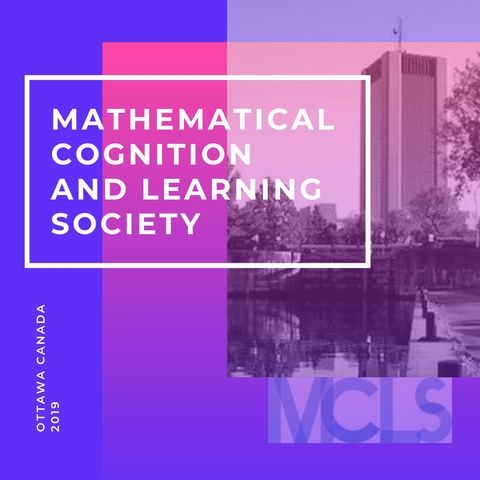Info
Presentations and conversations from the Mathematical Cognition and Learning Society Conference and the Counting on Teachers Forum held in Ottawa, Canada in June 2019

-
Dr. Helena Osana - The Counting on Teachers Forum
16 JUL 2019 · Dr. Helena Osana is a Professor and University Research Chair in Mathematical Cognition and Instruction at Concordia University, Dr. Osana was also the principle investigator on the grant that funded behind the Counting on Teachers Forum, held this year as part of the Mathematical Cognition and Learning Society Conference, Ottawa. In this conversation we talk about the journey into the world of research, but also about the important connects that need to be made between the world of education research and the practitioner community.33m 3s -
Dr. Martha Alibali - The Power of Gesture in Mathematical Learning
13 JUL 2019 · Dr. Martha Alibali conducts research at the intersection of developmental psychology, cognitive psychology, and mathematics education. Her primary line of research investigates mathematics learning and development, with a special focus on the role of gesture in mathematical thinking and knowledge change. She is also interested in the role of gesture in thinking and communication, particularly in educational settings.29m 15s -
Jalisha Braxton - Calculated Avoidance- Math Anxiety Leads to Math Avoidance in Effort- Based Decision-Making
22 JUN 2019 · Jalisha Braxton, a Doctoral student from the University of Chicago, presents her work on adult math anxiety, and the implications when negative feelings toward math are not addressed in childhood.13m 44s -
Lydia DeFlorio (Prentice Starkey) Preparing High-Need Children for Standards-Based Math Instruction in Elementary School
22 JUN 2019 · In this session, Lydia DeFlorio presents on behalf of WestEd's Prentice Starkey, exploring mathematical interventions in school. The research of Prentice Starkey, Centre Co-Director from WestEd in San Fransisco, is shared, including findings on preparing high-needs children for standards-based math instruction in Elementary School through involvement in two years of mathematics enrichment16m 25s -
Sarah Melo - Parent Journeys Through Number Talks with Their Children
22 JUN 2019 · Sarah Melo is a Master's student and teacher and, in this presentation, she discusses her intervention work with parents as they lead number talks at home with their children.16m 44s -
Maureen Vandermaas-Peeler - Parent Guidance of Preschoolers’ Inquiry and Mathematics in Activities at Home
22 JUN 2019 · Maureen Vandermaas-Peeler, psychology professor at Elon University, presents her research on parental guidance of preschoolers' inquiry and mathematical activities in the home.15m 45s -
Tracy Solomon - The Effectiveness of the Jump Math Program
22 JUN 2019 · Tracy Solomon (OISE/UT) describes the JUMP Math program, a unique, Canadian approach to K-8 math instruction, and show how its central tenets are empirically supported. This presentation includes a report on the results from two randomized-controlled studies involving 1400+ elementary students and their 200+ teachers in 60 schools in two different Canadian school boards. The results revealed positive effects of JUMP Math instruction on growth in elementary math achievement. The authors also report data on program implementation and teacher feedback about why JUMP Math works, which will be followed by a discussion of implications for policy and practice.19m 16s -
Nancy Jordan - Helping Teachers Identify and Support Children at Risk for Mathematical Difficulties
22 JUN 2019 · The importance of early number sense is addressed by Nancy C. Jordan (University of Delaware) and Alice Klein (WestEd) in this presentation . Research shows that number sense is malleable and early intervention leads to improved math achievement in school. Moreover, core deficiencies in number sense underlie math difficulties. In her talk, Nancy Jordan describes the development and validation of the Screener for Early Number Sense (SENS), an assessment tool to help teachers (preK, K, and 1st grade) identify children who may be at-risk for math difficulties and provide targeted instruction on specific number concepts.15m 8s -
Sarah Powell - How To Teach Students To Understand Word Problems
22 JUN 2019 · Sarah Powell (University of Texas at Austin), focuses on students' proficiency with setting-up and solving word problems. Research indicates that teaching students to understand the structure of word problems leads to better problem solving (Powell, Berry, & Barnes, 2019), and in this talk, Powell addresses what this looks like. She demonstrates how she taught elementary students three additive word-problem structures with a combination of explicit modeling, dialogue, gestures, visual representations, and authentic practice opportunities. She will highlight the word problem attack strategy and teaching students to use equations to represent a word problem's structure.16m 52s -
Martha Alibali - Focusing on Problem Structure - Visual Representations and Teacher Gesture
20 JUN 2019 · In this dynamic session, Martha Alibali encourages educators to pay attention to problem structure by focusing on two forms of instructional support: Visual Representations and Teacher Gesture. A lively look at some of the subtleties and nuances of problem solving in mathematics.17m 26s
Presentations and conversations from the Mathematical Cognition and Learning Society Conference and the Counting on Teachers Forum held in Ottawa, Canada in June 2019
Information
| Author | voicEd Radio |
| Categories | Education |
| Website | - |
| - |
Copyright 2024 - Spreaker Inc. an iHeartMedia Company
